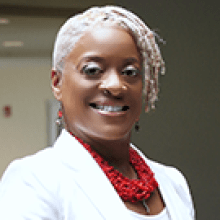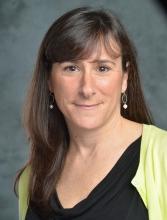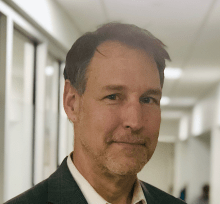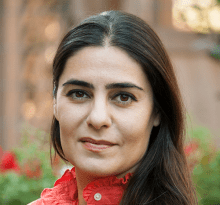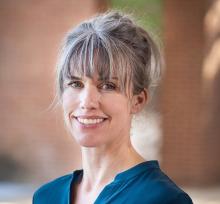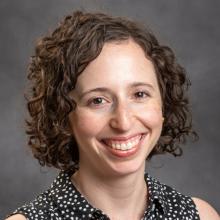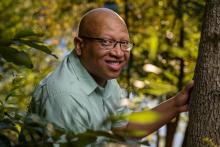The Office of Public Health Practice and Community Engagement is a team effort that involves UMD SPH faculty, staff, students, and alumni, the broader UMD community, and residents and leaders in all 23 Maryland counties and Baltimore City. We have a key team within the School of Public Health that helps to move the work forward.
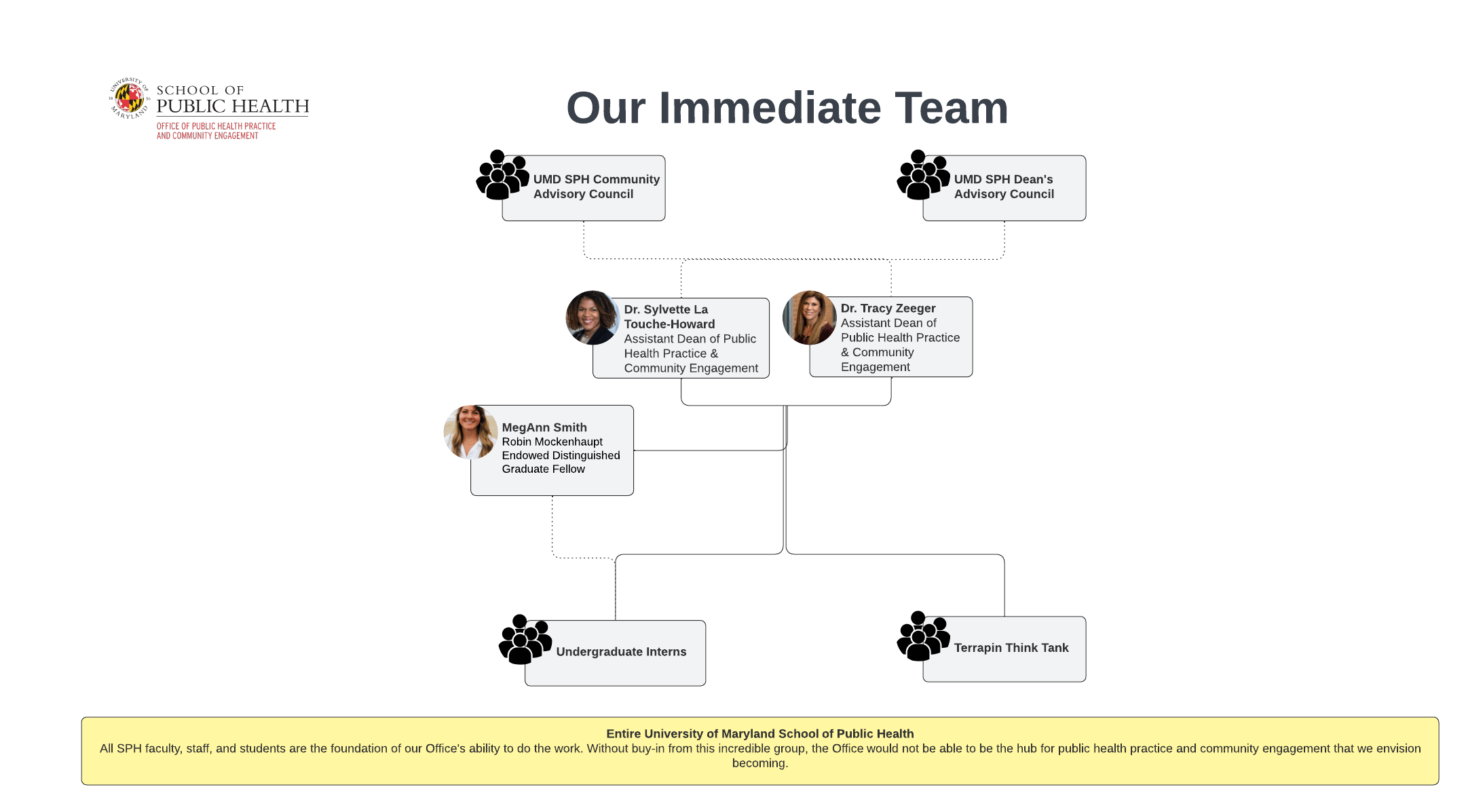
The SPH team is guided by two community groups: the SPH Community Advisory Council and the SPH Dean's Advisory Council. We have co-deans, a Robin Mockenhaupt Distinguished Graduate Fellow, and Undergraduate and Graduate Interns. View and download our organizational chart.
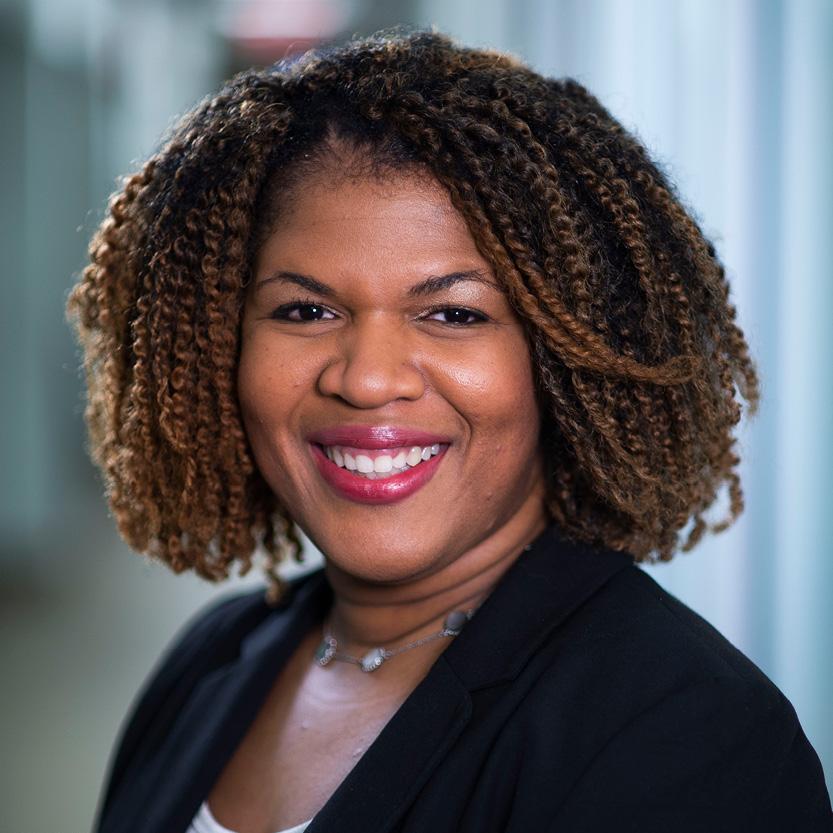
Sylvette La Touche-Howard (she/her)
Assistant Dean
Dr. Sylvette La Touche-Howard's passion lies in proactively working with individuals and communities to bridge behavioral health, research and social impact to create a sustainable and equitable future. She joined the SPH faculty as a lecturer in 2013 after earning her PhD in Behavioral and Community Health at the University of Maryland. She received her BA in Psychology and Women’s studies from McGill University and an MA in Mental Health Community Counseling from Andrews University. She teaches undergraduate and graduates courses that serve to instill students with the foundations of public health so that they can apply them to real-world problems by designing community-based initiatives. Dr. La Touche-Howard also acts as a liaison between the School and the local county health department by working on policy, systems, and environmental change initiatives.
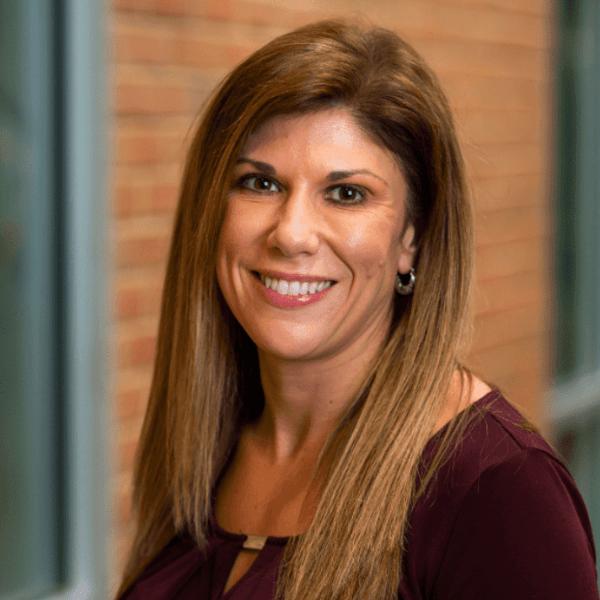
Tracy Zeeger (she/her)
Assistant Dean
Dr. Tracy Zeeger received her BS, MPH, and PhD all from the UMD School of Public Health. She began her work at the university developing/implementing health education programs on exercise, nutrition and stress management for the University Health Center. Dr. Zeeger joined the SPH faculty in 2011 as a lecturer and academic advisor. Since 2019, she has been the Director of Undergraduate Studies for the department of behavioral and community health. In this role, she has helped develop and assess anti-racism and professional development competencies. She has been a mentor to students as faculty advisor to the Epsilon chapter of Eta Sigma Gamma (a national health education honorary). Dr. Zeeger has worked with the Society for Public Health Education as chair of the Professional Preparation working committee; presented to the Association of Schools and Programs in Public Health on practice-based curriculum design; and served on the Board of Directors for the National Case Study Competition in Health Education. Her research interests include exercise among adolescents/young adults and professional readiness/educational outcomes of the students she serves.
Students
MegAnn Smith (she/her) is the Robin Mockenhaupt Endowed Distinguished Graduate Fellow for the Office of Public Health Practice and Community Engagement. She joined the UMD SPH to work toward her PhD in Behavioral and Community Health in the fall of 2022. She received her BS in Biology and Health Sciences from Guilford College and MPH from The Brown School of Social Work at Washington University in St. Louis. Most recently, MegAnn worked for the North Carolina Division of Public Health where she strived to center lived experiences and advance equity in injury and violence prevention. She is dedicated to dismantling systems of oppression through authentic community engagement and power sharing. MegAnn grounds her public health practice in cultural humility, radical listening, and a commitment to equity.
Amaya Jones (she/her) is a Master of Public Health student at Liberty University specializing in Community Health Promotion. As a Spring 2026 intern, Amaya is eager to collaborate with public health professionals to gain valuable experience and contribute to improving population health outcomes. Amaya is committed to serving underserved communities and addressing critical health challenges, such as the opioid epidemic. Amaya strives to support health initiatives that promote health equity and sustainable change.
Madelyn Kinney (she/her) is a junior majoring in Public Health Practice. She is passionate about health policy and equity, with research interests in LGBTQ+ health and medical cultural humility. After completing her undergraduate degree, she plans to pursue an MPH in Health Policy. Madelyn is excited to contribute to projects with the office. Outside of public health, she enjoys working out, reading, and spending time with friends.
Bidushi Lakhemaru (she/her) is a senior Public Health Science major who is passionate about raising awareness of health disparities in historically marginalized communities. She hopes to gain hands-on experience engaging with communities surrounding UMD to empower them in addressing these disparities in order to bridge the health inequity gap. She plans to attend graduate school for Epidemiology to continue advocating for and supporting underserved populations.
Karis Lee (she/her) is a sophomore majoring in Public Health Practice and with a minor in STEP (Science, Technology, Ethics, and Policy). Her academic interests are disparities in minority populations' health, medical ethics, and health policy and management. Karis strives to be on the pre-law track and hopes to use this internship as an opportunity to look at the medical system from a more personal perspective. In her free time, she loves to read (big historical fiction/nonfiction fan), watch documentaries, and go on long walks.
Daga Sinyan (she/her) is a Public Health Practice student, with interests in global health and ensuring health equity for underserved populations. Her aspirations include working in healthcare administration, and research. Outside of class, Daga enjoys going to the gym, and spending quality time with family.
| Fall 2022 | Spring 2023 |
|---|---|
| Chinaemelum Anadu | Paige Brown |
| Darah Davidson | Nasreen Bhumgara |
| Elyssa Cheung | Mina Tzoukermann |
| Josie Fay | Daniella Hanau |
| Itunu Jagun | Olivia Horowitz |
| Corrinne Yelsits |
| Summer 2023 | Fall 2023 | Spring 2024 |
|---|---|---|
| Monnyae Lucas | Camille Clarke | Blaize Shiebler |
| Christine Wang | Meghna Krishnan (continued Spring 2024) | Suad Esayed |
| Grace Zhang | Erin Lovell | |
| Yuka Taguchi | ||
| Priscilla Varghese |
| Summer 2024 | Fall 2024 | Spring 2025 |
|---|---|---|
| Barrie Pasternak | Fatoumata Diallo | Lahna Hall |
| Alexis McDougal | Jenny Lee | Yashica Yogeshwar |
| Xiao-Lian Warren | Alejandra Mata | |
| Julia Zuzovsky | Cynthia Bonany | |
| Julia Fay |
| Summer 2025 | Fall 2025 |
|---|---|
| Micaela Brena | Chantel Berkley |
| Lucy Nielsen | Lexa Millen |
| Katie Sonneveldt | Mya Smith |
| Arianna Wellington |
Affiliated Faculty
Dr. Amerlia Arria (she/her) is a Professor and Associate Chair at the UMD School of Public Health. Dr. Amelia Arria's research focuses on substance use and untreated mental health problems among adolescents and young adults, with a special focus on the connection between behavioral health and human capital. She values translating scientific findings for parents, policymakers and community stakeholders. As a first-generation college student, she is dedicated to making sure that higher education fulfills its promise as a place and a pathway to personal and professional success. She is Director of the Center on Young Adult Health and Development and Director of the School of Public Health's Office of Planning and Evaluation. You can read more about Dr. Arria on her faculty profile.
Dr. Cynthia Baur (she/her) is the Endowed Chair and Director of the Horowitz Center for Health Literacy at the UMD School of Public Health. Dr. Baur is a health literacy and health communication expert focused on improving health literacy at the individual, family, community and organizational levels. She directs the University of Maryland Horowitz Center for Health Literacy, the nation's first academic health literacy center, and is a professor in the Department of Behavioral and Community Health. In 2022, Dr. Baur and other advocates worked with Maryland Delegate Joseline Peña-Melnyk, who sponsored Maryland HB1082, to designate the Horowitz Center as the state's consumer health information hub. Dr. Baur is the Principal Investigator on multiple federal and state funded projects on health literacy, clear communication, digital health, diabetes prevention and organizational health literacy improvement. During the COVID-19 pandemic, the Center provided communications support to Maryland local health departments and coalitions, and pre and post-pandemic, the Center supports the Maryland Department of Health and local health departments on the state's diabetes action plan. Dr. Baur provides training and expert advice to local, state and national committees and initiatives. Before coming to UMD, she served for almost 20 years in the federal Office of Disease Prevention and Health Promotion and the Centers for Disease Control and Prevention (CDC), U.S. Department of Health and Human Services. She was CDC's Plain Language and Health Literacy Lead from 2011 to 2016.You can read more about Dr. Baur on her faculty profile.
Dr. Steven Ault (he/him) is a Lecturer at the UMD School of Public Health. As an Adjunct Lecturer/Instructor, Steven Ault teaches infectious disease epidemiology, global health and program and project policy planning and evaluation part-time. He is a public health biologist with over 30 years of technical, supervisorial and managerial experience in international public health and development programs and projects, principally in Latin America and the Caribbean. Ault retired from PAHO/WHO in 2015 after 20 years of service, lastly as Senior Advisor for Neglected Infectious and Tropical Diseases. You can read more about Dr. Ault on his faculty profile.
Dr. Typhanye Dyer (she/her) is an Associate Professor in the Epidemiology and Biostatistics Department at the UMD School of Public Health. Dr. Dyer is an infectious disease, social epidemiologist and health disparities scholar whose research examines the influence of social, psychological, behavioral and structural factors on HIV/STI-risk in Black populations. The majority of her research applies the concept of syndemics (complex, intersecting, synergistic psychosocial and structural barriers) to the lived experiences of Black sexual minority men (Black SMM), including exploring the intersections of trauma, poor mental health, criminal legal involvement and HIV/STI risk and acquisition. Regarding Black women, she uses a similar framework to develop an understanding of the impact of social position and intersectional structural discrimination on syndemic physical, social and neurocognitive frailties for older cisgender Black women living with of at risk for HIV. Her current research portfolio includes three NIH and one Gilad funded study that focus on syndemic non-communicable diseases among Nigerian sexual and gender minority folx, HIV-related syndemics among Black women in the deep south, PrEP-related syndemics in Black transgender women in the DMV and Atlanta, and syndemic frailties in Black cisgender women in the U.S. You can read more about Dr. Dyer on her faculty profile.
Dr. Mariana K Falconier (she/her) is an Associate Professor in Family Science and the Director of the Couple and Family Therapy Master's Program at the UMD School of Public Health. Dr. Mariana Falconier completed her master’s degree in Marriage and Family Therapy (MFT) and her doctoral degree in Family Studies at the University of Maryland. She is a professor and director of the Couple and Family Therapy Master's Program. She is a licensed marriage and family therapist and AAMFT approved supervisor. Her research focuses on how couples cope with stress and challenges, particularly regarding economic, immigration, and medical stressors. Her research and clinical experience have lead her to develop and implement a community program called TOGETHER/JUNTOS en PAREJA (www.togetherprogram.org) that integrates relationship and financial education.This evidence-based program that has been federally funded since 2015 for over $11 million and has enrolled over 1,200 couples aims at affirming, supporting, and promoting resilience among minoritized couples including low-income, Latine, African, African American, and LGBTQ. The program has been working with over 50 local community partner organizations to develop and sustain a network that provides information and access to resources for community members, training and employment opportunities for agency staff, assists with recruitment and referrals among organizations, and helps partners' services gain visibility and appreciation in our local communities. You can read more about Dr. Falconier on her faculty profile.
Dr. Jessica Fish (she/her) is an Assistant Professor in Family Science, the Deputy Director for Research & Evaluation at the UMD Prevention Research Center, and a Faculty Affiliate for the Maryland Population Research Center at the UMD School of Public Health. Dr. Fish is a human development and family science scholar whose research focuses on the health and well-being of sexual and gender minority (i.e., lesbian/gay, bisexual, and transgender) people and their families. Broadly, Dr. Fish studies the social and interpersonal factors that shape the development and health of sexual and gender minority youth and adults. Her overarching goal is to identify modifiable factors that contribute to sexual and gender minority health disparities in order to inform developmentally-sensitive policies, programs and prevention strategies that promote the health of sexual and gender minority people across the life course. You can read more about Dr. Fish on her faculty profile.
Dr. Amy Lewin (she/her) is an Associate Professor in Family Science at the UMD School of Public Health. Prior to coming to the University of Maryland in 2014, she was on the faculty at Children’s National Medical Center in Washington, D.C. A clinical psychologist by training, Dr. Lewin works with community partners to develop and evaluate community-led interventions. Her goal is to strengthen the health and well-being of marginalized youth and families who face significant disparities in health and education. The primary focus of her research is on the health of adolescents. Dr. Lewin’s research interests include community-based participatory research, teen parent families, integration of alternative models of mental health care into youth-serving organizations, and the development of interventions to address social, cultural, and familial determinants of health and health disparities. You can read more about Dr. Lewin on her faculty profile.
Dr. Kevin Roy (he/him) is a Professor in Family Science at the UMD School of Public Health. Dr. Roy is recognized as an expert in the field of fatherhood research, with two decades of experience working with low-income families and community-based parenting programs. His research focuses on the life course of young men on the margins of kin networks and the workforce, as they transition into adulthood and fatherhood. You can read more about Dr. Roy on his faculty profile.
Dr. Negin Fouladi (she/her) is an Associate Professor of Health Policy and Management at the UMD School of Public Health. Dr. Negin Fouladi serves as program director and academic and career development advisor of online programs (MPH in Public Health Practice and Policy, MHA, dual MD/MHA with UMB School of Medicine) in the Department of Health Policy and Management (HPM). She teaches graduate and undergraduate courses on health systems, health policy and services research methods, health care strategic planning & marketing, global health and health policy and mentors internship and capstones of HPM online programs. She has expertise in Translational Science focused on T3/T4 translation to practice and policy. You can read more about Dr. Fouladi on her faculty profile.
Dr. Melvin Seale (he/him) is an Assistant Clinical Professor in Health Policy and Management at the UMD School of Public Health. Dr. Seale earned a Doctor of Health Science from A.T. Still University, where his dissertation focused on identifying barriers to interoperability and implementation of electronic health record systems within ambulatory care facilities. He also holds a Master of Arts in Teaching (MAT) from Marygrove College and a Bachelor of Science in Health Information Management. Dr. Seale is a Registered Health Information Administrator and is certified in Clinical Coding Classification Systems (e.g., ICD-10, CPT, HCPCS). Before arriving at UMD, Dr. Seale served as Manager of Healthcare Quality & Compliance for the CVS Health Corporation and Director of the Health Information Management program at Gordon State College. In addition, he developed the curriculum for the Master of Health Informatics program at The University of Findlay and was an instructor in a joint Healthcare Administration program between Colorado State University and Saudi Electronic University in Saudi Arabia. His research interests include the impact of health informatics and telemedicine on improving population health outcomes. Dr. Seale understands the importance of health information technology and its role in managing chronic diseases, creating evidence-based practices and eliminating health disparities. You can read more about Dr. Seale on his faculty profile.
Dr. Shannon Jette (she/her) is an Associate Professor and the Director of Graduate Studies in Kinesiology at the UMD School of Public Health. Dr. Jette is a feminist scholar who engages in the study of women’s health and fitness practices across the life course. Through her research, she has sought to better understand how individuals (particularly marginalized individuals) negotiate the at times competing discourses about the (in)active body and health, as well as their embodied experiences of physical activity. The goal of her research agenda has been to question taken-for-granted knowledge about the gendered body, also providing space for alternative ways of knowing about the body and health, including Eastern traditions and Indigenous knowledge. Her work contributes to scholarship on health disparities via my focus on the development of ‘embodiment’ as a framework for understanding how social inequities are manifested in biological health disparities as well as how social positioning is incorporated into bodily movements and lifestyle choices. She has extensive experience utilizing a variety of qualitative research methods (ethnographic techniques, in-depth interviewing, media analysis, poststructuralist discourse analysis, focus group methods, audience studies), and has developed expertise in theories that help us explore societal power inequities as they pertain to the body and health. Her research agenda has facilitated the creation of culturally nuanced health promotion messages and practices that are attuned to societal inequalities and resulting health disparities. You can read more about Dr. Jette on her faculty profile.
Dr. Jennifer D. Roberts (she/her) is a tenured Associate Professor in Kinesiology at the UMD School of Public Health. Her scholarship focuses on the impact of built, social and natural environments, including the institutional and structural inequities of these environments, on physical activity and public health outcomes of marginalized communities. Dr. Jennifer D. Roberts is an active living, health equity, and truth telling scholar who draws on history to understand and dismantle the health disparities and social injustices that marginalized populations and communities of color endured generationally and presently. Her lived experience and observation of racialization have embodied and informed her approach to scientific discovery and ultimately to her quest for an antiracist society where the basic human rights of health, equity, and justice are no longer denied. She is also the Executive Founding Director of the Wekesa Earth Center, Co-Founder/Co-Director of NatureRx@UMD, and Director of the Public Health Outcomes and Effects of the Built Environment (PHOEBE) Laboratory. You can read more about Dr. Roberts on her faculty profile.
Dr. Rachel Rosenberg Goldstein (she/her) is an Assistant Professor in the Maryland Institute for Applied Environmental Health (MIAEH) at the UMD School of Public Health. Dr. Rosenberg Goldstein is a water quality specialist, analyzing water quality and the most effective ways to communicate about water. She is the co-project director for Extension and Outreach in CONSERVE, a Center of Excellence at the Nexus of Sustainable Water Reuse, Food, & Health. Her current research includes evaluating roof-harvested rainwater quality, measuring neural responses to water reuse videos and assessing gardening as a stress management technique. You can read more about Dr. Rosenberg Goldstein on her faculty profile.
Dr. Sacoby Wilson (he/him) is the Director of Community Engagement, Environmental Justice, and Health and a Professor in the Maryland Institute for Applied Environmental Health at the UMD School of Public Health. Dr. Wilson has over 20 years of experience as environmental health scientist in the areas of exposure science, environmental justice, environmental health disparities, community-based participatory research, water quality analysis, air pollution studies, built environment, industrial animal production, climate change, community resiliency, and sustainability. He works primarily in partnership with community-based organizations to study and address environmental justice and health issues and translate research to action. You can read more about Dr. Wilson on his faculty profile.









